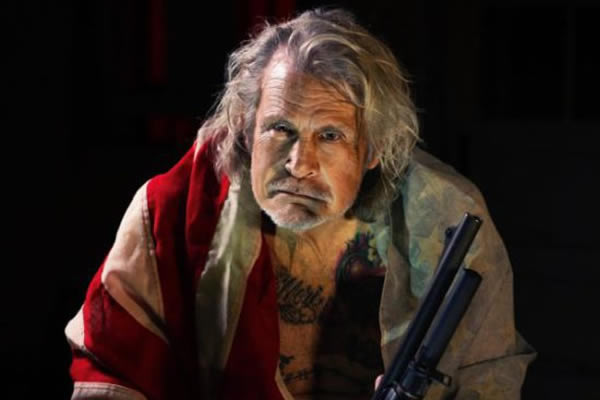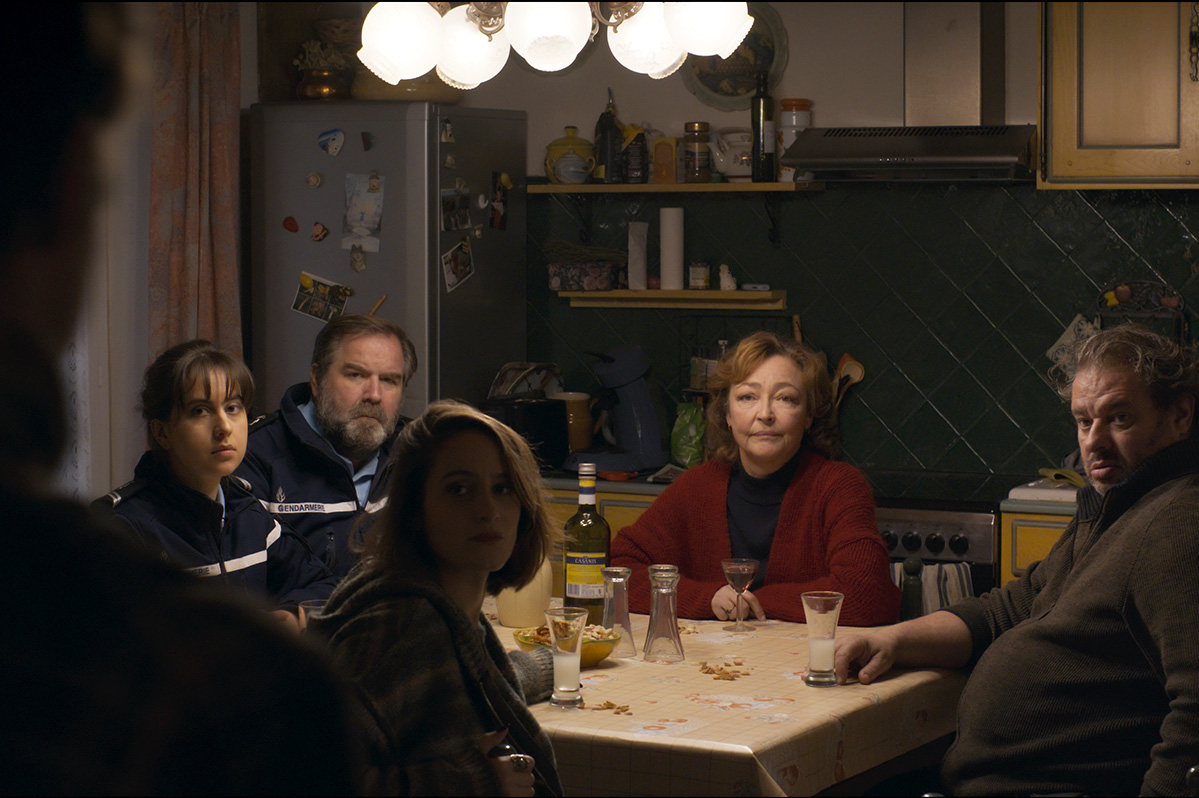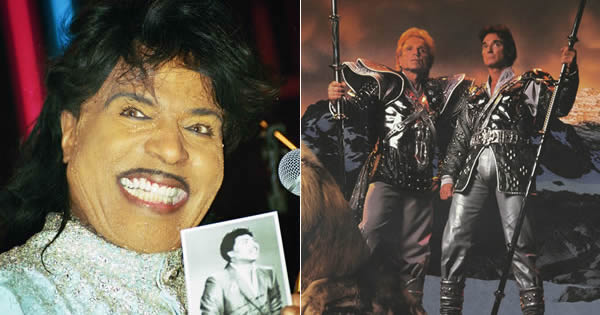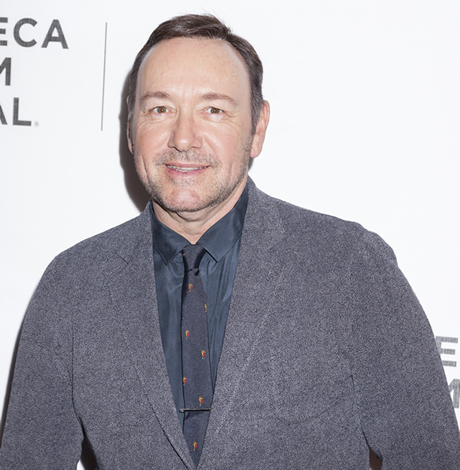Movies
Michael Kearns, the godfather of LGBTQ authenticity
First ‘out’ actor in Hollywood on his road from porn to fatherhood to latest film

The arc of LGBTQ+ history over the past 50 years has been one of constant upheaval and evolvement. From a period when it was both illegal and insane to be gay, through the achievement of being able to serve openly in the military, to marriage equality and the ability to create families to today’s fight against the tyranny against Trans people, the movement has not stopped to take a breath.
Michael Kearns, the first recognized “out” actor on the Hollywood landscape, has been a visible presence through it all. More importantly, he has always been visible on the gay scene. In the seventies he epitomized the free love and erotic freedom that many gay men lived. He was featured in classic gay porn movies and did a PR stint as the face of the “happy hustler.”
“That was my introduction to a lot of people,” Michael told me when we sat down for a chat on Rated LGBT Radio. “I kind of captured the zeitgeist of the times, the freewheeling seventies. We forget that there was that period of time when sexuality was joyful and exciting and thrilling.”
In the eighties he was visible in mainstream media as a gay man playing gay men characters. In 1983, Michael was cast in a minor role on the “Cheers” Emmy-winning episode “The Boys in the Bar.” He was instantly recognized for his gay sexual iconic status by LGBTQ audiences, even though the population at large did not know who he was. The casting director who fought for his casting was Stephen Kolzak, who would himself become a prominent AIDS activist before he died at 37 in 1990. Stephen cast Michael to make a statement. He wanted to signal to the LGBTQ community that “Cheers” had our backs. “He was one of the only ones that had the guts,” Michael remembers.
“There were a lot of stereotypes in television regarding gay portrayals. I was pegged and cast in some of those roles. I did play the stereotype, but rather than a straight guy playing those roles, I brought authenticity. I was real. Straight guys playing gay would always spoof the role. They were always ‘winking’ and signaling to the camera ‘I am not really that way.’ So, the performances are by in large horrible, even with some Academy Award winners. The actors were constantly saying that it was not who they were — if they weren’t making that clear on the talk shows, they were doing it in the performance itself,” Michael says.
Michael soon morphed into an HIV-positive man playing HIV-positive characters, while off camera becoming a visible and vocal AIDS activist. “It was a new kind of cliché. They had to always make me look horrible. The ghastlier the better. They could not have an HIV character who looked normal — as I did when I arrived at the set. Finally, I had enough and refused to do that anymore.” Michael then immersed himself in theater where he found greater character honesty and truth.
As gay men captured their identities in the ‘90s as husbands and fathers, Michael was there too — becoming one of the first gay men to adopt a child. It is that role, as a father, that Michael has said is his greatest.
Today, Michael has been a driving force behind QueerWise, a multigenerational writing collective and performance group. Through QueerWise, Michael gives poetic voice to talent that would otherwise be voiceless. Its members include published poets, writers of fiction and non-fiction, playwrights, singers, musicians, social activists, dancers, actors, artists and teachers.
QueerWise launched its latest work last month, “The Ache for Home.”
“The Ache for Home is a video presentation of heartfelt stories from formerly homeless/unhoused individuals in and around West Hollywood. It was developed through a mentorship program facilitated by QueerWise members. The production represents citizens-turned-writers who share their inspirational stories from those glamorous streets and sidewalks, ranging from soaring self-acceptance to narratives of truth-telling defeats,” said Michael. The production can be seen on QueerWise’s YouTube channel.
The “Ache for Home” features a young cis male with a passion for music and art, who finds joy “when I can put a smile on someone’s face and give back”, a retired mixed race bisexual government worker who is a voracious reader and literacy advocate, two trans males who share their experiences of living on the street, and a former resident playwright who was homeless for 44 days and nights in the city. “I am thrilled at our inclusion of trans men in this work,” Michael says. “It is a poorly represented community within a poorly represented community.”
On current controversies, particularly the Dave Chappelle issue, Michael notes, “I am glad it is generating passion. It is bringing up conversation on the plights of Black trans women who are victimized at an alarming rate, we should not say victimized… we should say murdered. I am glad we are shedding light on that.”
Michael’s work has been described as “collisions of sex and death, of eroticism and grief,” but he has truly dug to an even deeper level. “The Ache for Home” takes its inspiration from the Maya Angelou quote, “The ache for home lives in all of us, the safe place where we can go as we are and not be questioned.” Michael Kearns’ work has always encouraged us to go, and live, “as we are.” He is the amalgamation of eroticism, grief, healing, and appreciating the richness of life itself.
He is the godfather of LGBT+ authenticity. In earlier days, he may have represented sex; he may have walked us through a period of darkness and death into the arms of the creation of the new family. He has now brought us home, and when we look at him, we see a new quality: wisdom.
Movies
An ‘Indian Boy’ challenges family tradition in sweet romcom
Refreshing look at what is possible when a family is willing to make changes

For queer audiences hungry for representation, nothing says “I feel seen” quite as much as a good queer romcom.
Perhaps it’s because love stories are universal, differing from culture to culture in the surface dealings only, and therefore have the potential for helping straight audiences understand a different kind of love a little better; or perhaps, in seeing our kind of love displayed so publicly, we feel a sense of validation. Whatever the reason, it rings our bell.
Maybe that’s why the quest for the first “great gay romcom” has continued to be a driving factor in the ongoing history of queer cinema, setting up an expectation in the mainstream that has, perhaps inevitably, fallen short of creating it. Fortunately, there are some efforts that have risen above the pressure to simply be what they are, instead of being the answer to everybody’s prayers for acceptance, and in so doing have managed to come close.
“A Nice Indian Boy” is just that kind of movie. Adapted from a play by Madhuri Sheka (by Eric Randall, whose screenplay made Hollywood’s buzzy “Black List” of un-produced scripts in 2021) and directed by Canadian-born Indian filmmaker Roshah Sethi, it might come closer to presenting an entirely successful gay romcom than most of the other overthought efforts that have come before.
It centers on Naveen (Karan Soni), a 30-something gay doctor, whose South Asian Indian family has long since accepted and supported his orientation but still struggles to reconcile it with their traditional beliefs. Enter Jay (Jonathan Groff), a white freelance photographer who grew up as an adoptee to Indian parents, and of course it’s love at first sight. A whirlwind courtship leads to a proposal, but there are a lot of considerations that must be met before the smitten couple can achieve the “big Indian wedding” of their dreams. The one that looms largest is gaining the approval of Naveen’s progressive-but-devout Hindu parents (Harish Patel and Zarna Garg) – not to mention his discontented sister (Sunita Mani) – whose confusion over his new fiancé’s ethnicity is just one of many obstacles they face in making their dream nuptials a reality. Intensifying that challenge – frequently to comedic effect – is Naveen’s struggle with his own insecurities, which threaten to derail not only the wedding plans but his relationship with the emotionally open and unreservedly passionate Jay, too.
It’s a sweet and clearly heartfelt affair, with a few laugh-out-loud moments to be found, as well as the wry introspection of its neurotic lead character, whose self-questioning turmoils feel like a connecting thread to the work of Woody Allen – indeed, “Annie Hall” is even name-dropped in the film, suggesting a spirit of homage that can be traced in a reflection of that classic Oscar-winner’s title character through Jay’s quirkily unconventional personality.
At the same time, the movie marries its diverse cultural influences by drawing just as heavily from a love of “Bollywood” cinema, and one of its movies in particular, which both of its protagonists adore. That allows it to maintain an aura of lush, larger-than-life romanticism that complements the amusingly endearing self-deprecation of its main protagonist; it also reflects in the movie’s colorful, lively visual aesthetic and its choice to share focus on an entire family of characters for a more sweeping perspective.
As for its handling of the subject of race, despite its clear (and queer) twist on the “Guess Who’s Coming to Dinner?” trope of a family’s surprise over a bi-ethnic romance in its midst, “Indian Boy” doesn’t spend much time worrying about a love connection shared across racial divides; and while it gets considerable comic mileage out of Naveen’s parents’ well-intentioned but clueless efforts to show their acceptance of their gay son, the queerness of his relationship is not really an issue in itself. Rather, the conflict comes – for all of the movie’s primary characters, not just for the couple in the middle – from the difficulty of finding harmony between old customs and a new world that no longer fits within their boundaries.
Admittedly, Sethi’s movie sometimes feels a little too sentimental to be believed; it paints an aspirational picture – a true-love romance between a successful doctor and a rising artist – and tugs even harder on our heartstrings with its depictions of clumsy-but-sincere acceptance from the family around them; and while we don’t want to spoil any surprises, when it comes time for the big finale, it pulls out all the feel-good stops. Cynics in the audience might fail to be as enchanted as it wants them to be.
And yet, it all works wonderfully, largely because of its cast. Soni and Groff have an instantly tangible chemistry, and their differing personalities complement each other perfectly. Individually, they take us with them on their personal journeys with just as much clarity and conviction, and the movie would fall flat without the strength of their performances at its core.
Equally superb, however, are Patel and Garg, whose discomfort over the preparations for their son’s wedding never feel like they come from anywhere but love and a desire to share in his happiness; and Suri, whose considerable comedic talents contrast to great effect with the brewing discord within, lends a much-needed weight to the mix while still managing to glow alongside all her costars.
Combined with the sharp, funny, and insightful script and the generosity of Sethi’s directorial approach, which frames each character with respect and import to the story, it all makes “A Nice Indian Boy” a nice crowd-pleasing movie to see. It may or may not be “the great gay romcom,” and it might all seem a bit too glossy and perfect for some viewers’ taste – but it offers a refreshing look at what is possible when a family is willing to make changes in their way of life simply for the sake of love. What message could be more positive than that?
“A Nice Indian Boy” is now playing in theaters.
Movies
Sexy small town secrets surface in twisty French ‘Misericordia’
A deliciously depraved story with finely orchestrated tension

The name Alain Guiraudie might not be familiar to most Americans, but if you mention “Stranger by the Lake,” fans of great cinema (and especially great queer cinema) are sure to recognize it immediately as the title of the French filmmaker’s most successful work to date.
The 2013 thriller, which earned a place in that year’s “Un Certain Regard” section of the Cannes Film Festival and went on to become an international success, mesmerized audiences with its tense and erotically charged tale of dangerous attraction between two cruisers at a gay beach, one of whom may or may not be a murderer. Taut, mysterious, and transgressively explicit, its Hitchcockian blend of suspense, romance, and provocative psychological exploration made for a dark but irresistibly sexy thrill ride that was a hit with both critics and audiences alike.
In the decade since, he’s continued to create masterful films in Europe, becoming a favorite not only at Cannes but other prestigious international festivals. His movies, each in their own way, have continued to elaborate on similar themes about the intertwined impulses of desire, fear, and violence, and his most recent work – “Misericordia,” which began a national rollout in U.S. theaters last weekend – is no exception; in fact, it draws all the familiar threads together to create something that feels like an answer to the questions he’s been raising throughout his career. To reach it, however, he concocts a story of small town secrets and hidden connections so twisted that it leaves a whole array of other questions in its wake.
It centers on Jérémie (Félix Kysyl), an unemployed baker who returns to the woodsy rustic village where he spent his youth for the funeral of his former boss and mentor. Welcomed into the dead man’s home by his widow, Martine (Catherine Frot), the visitor decides to extend his stay as he reconnects to his old home town and his memories. His lingering presence, however, triggers jealousy and suspicion from her son – and his own former school chum – Vincent (Jean-Baptiste Durand), who fears he has ulterior motives, while his sudden interest in another old acquaintance, Walter (David Ayala), only seems to make matters worse. It doesn’t take long before circumstances erupt into a violent confrontation, enmeshing Jérémie in a convoluted web of danger and deception that somehow seems rooted in the unspoken feelings and hidden relationships of his past.
The hard thing in writing about a movie like “Misericordia” is that there’s really not much one can reveal without spoiling some of its mysteries. To discuss its plot in detail, or even address some of the deeper issues that drive it, is nearly impossible without giving away too much. That’s because it’s a movie that, like “Stranger by the Lake” and much of Guiraudie’s other work, hinges as much on what we don’t know as what we do. Indeed, in its earlier scenes, we are unsure even of the relationships between its characters. We have a sense that Jérémie is perhaps a returning prodigal son, that Vincent might be his brother, or a former lover, or both, and that’s just stating the most obvious ambiguities. Some of these cloudy details are made clear, while others are not, though several implied probabilities emerge with a little skill at reading between the lines; it hardly matters, really, because as the story proceeds, new shocks and surprises come our way which create new mysteries to replace the others – and it’s all on shaky ground to begin with, because despite his status as the film’s de facto protagonist, we are never really sure what Jérémie’s real intentions are, let alone whether they are good or bad.
That’s not sloppy writing, though – it’s carefully crafted design. By keeping so much of the movie’s “backstory” shrouded in loaded silence, Guiraudie – who also wrote the screenplay – reminds us that we can never truly know what is in someone else’s head (or our own, for that matter), underscoring the inevitable risk that comes with any relationship – especially when our passions overcome our better judgment. It’s the same grim theme that was at the dark heart of “Stranger,” given a (slightly) less macabre treatment, perhaps, but nevertheless there to make us ponder just how far we are willing to place ourselves in danger for the sake of getting what – or who – we desire.
As for who desires what in “Misericordia,” that’s often as much of a mystery as everything else in this seemingly sleepy little village. Throughout the film, the sparks that fly between its people often carry mixed signals. Sex and hostility seem locked in an uncertain dance, and it’s as hard for the audience to know which will take the lead as it is for the characters – and if the conflicting tone of the subtext isn’t enough to make one wonder just how sexually adventurous (and fluid) these randy villagers really are beneath their polite and provincial exteriors, the unexpected liaisons that occur along the way should leave no doubt.
Yet for all its murky morality and guilty secrets, and despite its ominous motif of evil lurking behind a wholesome small-town surface, Guiraudie’s pastoral film noir goes beyond all that to find a surprisingly humane layer rising above it all, for which the town’s seemingly omnipresent priest (Jacques Develay) emerges to highlight in the film’s third act – though to reveal more about that (or about him) would be one of those spoilers we like to avoid.
There’s a clue to be found, however, in the film’s very title, which in Catholic tradition refers to the merciful compassion of God for the suffering of humanity, but can be literally translated simply as “mercy.” Though it spends much of its time illuminating the sordid details of private human behavior, and though the journey it takes is often quite harrowing, “Misericordia” has an open heart for all of its broken, stunted, and even toxic characters; Guiraudie treats them not as heroes or villains, but as flawed, confused, and entirely relatable human beings. In the end, we may not know all of their dirty secrets, we feel like we know them – and in knowing them can find a share of that all-forgiving mercy for even the worst of them.
It’s worth mentioning that it’s also a movie with a lot of humor, brimming with comically absurd character moments that somehow remind us of our own foibles even as we laugh at theirs. The cast, led by the opaquely sincere Kysyl and the delicately provocative Frot, forge a perfect ensemble to create the playful-yet-gripping tone of ambiguity – moral, sexual, and otherwise – that’s essential in making Guiraudie’s sly and ultimately wise observations about humanity come across.
And come across they do – but what makes “Misericordia” truly resonate is that they never overshadow its deliciously depraved story, nor dilute the finely orchestrated tension his film maintains to keep your heart pounding as you take it all in.
To tell the truth, we already want to watch it again.
Movies
Stellar cast makes for campy fun in ‘The Parenting’
New horror comedy a clever, saucy piece of entertainment

If you’ve ever headed off for a dream getaway that turned out to be an AirBnB nightmare instead, you might be in the target audience for “The Parenting” – and if you also happen to be in a queer relationship and have had the experience of “meeting the parents,” then it was essentially made just for you.
Now streaming on Max, where it premiered on March 13, and helmed by veteran TV (“Looking,” “Minx”) and film (“The Skeleton Twins,” “Alex Strangelove”) director Craig Johnson from a screenplay by former “SNL” writer Kurt Sublette, it’s a very gay horror comedy in which a young couple goes through both of those excruciatingly relatable experiences at once. And for those who might be a bit squeamish about the horror elements, we can assure you without spoilers that the emphasis is definitely on the comedy side of this equation.
Set in upstate New York, it centers on a young gay couple – Josh (Brandon Flynn) and Rohan (Nik Dodani) – who are happily and obviously in love, and they are proud doggie daddies to prove it. In fact, they are so much in love that Rohan has booked a countryside house specifically to propose marriage, with the pretext of assembling both sets of their parents so that each of them can meet the other’s family for the very first time. They arrive at their rustic rental just in time for an encounter with their quirky-but-amusing host (Parker Posey), whose hints that the house may have a troubling history leave them snickering.
When their respective families arrive, things go predictably awry. Rohan’s adopted parents (Edie Falco, Brian Cox) are successful, sophisticated, and aloof; Josh’s folks (Lisa Kudrow, Dean Norris) are down-to-earth, unpretentious, and gregarious; to make things even more awkward, the couple’s BFF gal pal Sara (Vivian Bang) shows up uninvited, worried that Rohan’s secret engagement plan will go spectacularly wrong under the unpredictable circumstances. Those hiccups, and worse, begin to fray Josh and Rohan’s relationship at the edges, revealing previously unseen sides of each other that make them doubt their fitness as a couple – but they’re nothing compared to what happens when they discover that they’re also sharing the house with a 400-year-old paranormal entity, who has big plans of its own for the weekend after being trapped there alone for decades. To survive – and to save their marriage before it even happens – they must unite with each other and the rest of their feuding guests to defeat it, before it uses them to escape and wreak its evil will upon the world.
Drawing from a long tradition of “haunted house” tropes, “The Parenting” takes to heart its heritage in this campiest-of-all horror settings, from the gathering of antagonistic strangers that come together to confront its occult secrets to the macabre absurdity of its humor, much of which is achieved by juxtaposing the arcane with the banal as it filters its supernatural clichés through the familiar trappings of everyday modern life; secret spells can be found in WiFi passwords instead of ancient scrolls, the noisy disturbances of a poltergeist can be mistaken for unusually loud sex in the next room, and the shocking obscenities spewed from the mouth of a malevolent spectre can seem as mundane as the homophobic chatter of your Boomer uncle at the last family gathering.
At the same time, it’s a movie that treats its “hook” – the unpredictable clash of personalities that threatens to mar any first-time meeting with the family or friends of a new partner, so common an experience as to warrant a separate sub-genre of movies in itself – as something more than just an excuse to bring this particular group of characters together. The interpersonal politics and still-developing dynamics between each of the three couples centered by the plot are arguably more significant to the film’s purpose than the goofy details of its backstory, and it is only by navigating those treacherous waters that either of their objectives (combining families and conquering evil) can be met; even Sara, who represents the chosen family already shared by the movie’s two would-be grooms, has her place in the negotiations, underlining the perhaps-already-obvious parallels that can be drawn from a story about bridging our differences and rising above our egos to work together for the good of all.
Of course, most horror movies (including the comedic ones) operate with a similar reliance on subtext, serving to give them at least the suggestion of allegorical intent around some real-world issue or experience – but one of the key takeaways from “The Parenting” is how much more satisfyingly such narrative formulas can play when the movie in question assembles a cast of Grade-A actors to bring them to life, and this one – which brings together veteran scene-stealers Falco, Kudrow, Cox, Norris, and resurgent “it” girl Posey, adding another kooky characterization to a resume full of them – plays that as its winning card. They’re helped by Sublett’s just-intelligent-enough script, of course, which benefits from a refusal to take itself too seriously and delivers plenty of juicy opportunities for each of its actors to strut their stuff, including the hilarious Bang; but it’s their high-octane skills that bring it to life with just the right mix of farcical caricature and redeeming humanity. Heading the pack as the movie’s main couple, the exceptional talent and chemistry of Dodani and Flynn help them hold their own among the seasoned ensemble, and make it easy for us to be invested enough in their couplehood to root for them all the way through.
As for the horror, though Johnson’s movie plays mostly for laughs, it does give its otherworldly baddie a certain degree of dignity, even though his menace is mostly cartoonish. Indeed, at times the film is almost reminiscent of an edgier version of “Scooby-Doo”, which is part of its goofy charm, but its scarier moments have enough bite to leave reasonable doubt about the possibility of a happy ending. Even so, “The Parenting” likes its shocks to be ridiculous – it’s closer to “Beetlejuice” than to “The Shining” in tone – and anyone looking for a truly terrifying horror film won’t find it here.
What they will find is a brisk, clever, saucy, and yes, campy piece of entertainment that will keep you smiling almost all the way through its hour-and-a-half runtime, with the much-appreciated bonus of an endearing queer romance – and a refreshingly atypical one, at that – at its heart. And if watching it in our current political climate evokes yet another allegory in the mix, about the resurgence of an ancient hate during a gay couple’s bid for acceptance from their families, well maybe that’s where the horror comes in.
















